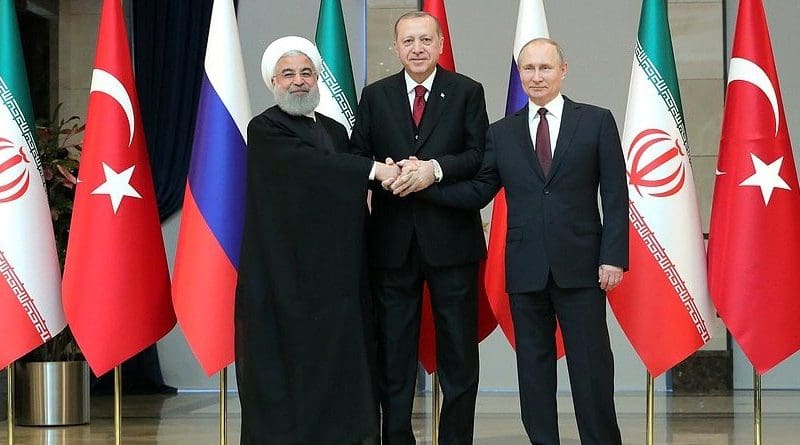Unlikely Alliance Aims To Bring Stability To Syria – OpEd
By Arab News
By Talmiz Ahmad*
The conflict in Syria has brought together three unlikely allies, as Russia has pulled Turkey — a NATO member and US ally — into its orbit, along with Iran, which was until recently Turkey’s opponent in Syria, when Ankara was backing rebel groups against the Bashar Assad regime. This alliance was further cemented at their second tripartite summit in Ankara on Wednesday, following their earlier conclave at Sochi in November last year.
Like most alliances in international affairs, it is a marriage of convenience. Russia has asserted its interests in the Middle East as part of its effort to project itself as a significant player in the global scenario, while Iran is a long-standing ally of Syria.
Turkey is a recent member of this triumvirate. Having backed rebels against Assad for about five years, including some extremists who flocked to Syria through the Turkish “superhighway,” Ankara performed a U-turn in 2016. First, President Recep Tayyip Erdogan got disenchanted with the US during the attempted coup in 2016, which he believed had been fomented by the cleric exiled in the US, Fethullah Gulen, and demanded his extradition.
Meanwhile, in its immediate neighborhood, Turkey saw that the principal beneficiaries of the Syrian conflict were the Kurds, who had carved out an autonomous enclave across the Turkey-Syria border. Turkey views the Syrian Kurds as an extension of its own dissident Kurds, organized in the Kurdistan Workers’ Party (PKK), and hence saw the Rojava (western homeland) as providing strategic depth and sanctuary to the PKK.
Turkey’s twin concerns relating to the US and the Kurds have coalesced, with the US setting up a robust alliance with the Kurds to promote their shared interests in Syria.
This culminated in the announcement by former US Secretary of State Rex Tillerson in January that it would extend its military presence and also organize a 30,000-strong Kurdish force in the region.
Turkey immediately moved its troops into Syria and, in late March, took the town of Afrin to break the contiguity of the Kurdish homeland and enable Turkish troops to keep the Kurds in check.
Turkey sees the Russian-Iranian alliance as the best safeguard for its interests and is working with them to promote the Astana peace process. It also announced its estrangement from the US by buying the Russian S-400 missile system, to be delivered in July next year — an unprecedented act by a NATO member.
The Ankara summit took place in the background of two important developments: First the fall of Eastern Ghouta to Syrian troops, and second the announcement by US President Donald Trump that, following the defeat of Daesh, he had every intention of withdrawing US forces from Syria.
This contradicted the Pentagon policy of the US staying on in Syria (and Iraq) in the name of fighting the remnants of Daesh forces, while actually opposing Iranian influence in the region and backing Israeli interests. Amid this confusion in the US, the Russia-led alliance sees itself as the only effective role-player in the turbulent affairs of the region.
Regional media outlets have described the summit as putting in place a “tripartite strategic axis” that will be an effective weapon against the re-emergence of Daesh, bring stability to Syria, and thwart Kurdish aims of autonomy and possibly even independence. Reflecting this consensus, the joint statement issued at Ankara opposed separatist elements in Syria, a clear reference to the Kurds, and affirmed the need to uphold the sovereignty and territorial integrity of Syria.
Again, without naming the US, it opposed the presence of foreign elements that were trying to change the domestic situation by using various excuses. The three leaders also affirmed their commitment to defeat all “terrorist” groups in Syria, an endorsement of the Syrian-Iranian position.
While the three leaders are now on the same page, they have important differences between them. Thus, while Russia has worked with Turkey in its taking of Afrin and will facilitate its expected takeover of Tel Rifaat, both Russia and Iran are uneasy about a long-term Turkish military presence in Syria.
This will require the three of them to wean the Kurds away from the US and integrate them into a federal Syria where their aspirations can be accommodated.
Similarly, Turkey has concerns relating to the continued Iranian presence in Syria, which are shared by Jordan and Israel and have led to talk of a region-wide conflict.
Above all, the future of Assad in the Syrian scenario and the future political dispensation in the country will be matters of disagreement between Iran and Turkey.
However, for now the three seem solidly united, brought together by their opposition to US and Israeli interests in the Middle East. Russian diplomacy, buttressed by Putin’s commitment to the affiliation, is likely to see them working together for the foreseeable future. This will have important implications for Syria and indeed the Middle East as a whole.
• Talmiz Ahmad, a former Indian diplomat, holds the Ram Sathe Chair for International Studies, Symbiosis International University, Pune, India.

